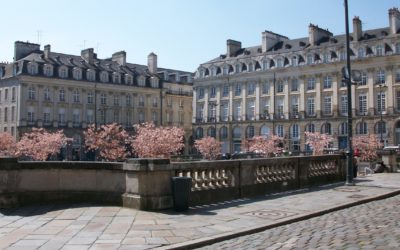French visit to Swedish biomass plant • The army and SNCF connect to DHC network in Lyon • Eurometropole Strasbourg and Engie accelerate green heating • Read more about the developments in sustainable heating and cooling in this month's news update from France

RISE Research institutes of Sweden and the Swedish Bioenergy Association (Svebio) organised on the second week of March a visit for French stakeholders to several Swedish biomass plants in the Gothenburg region on the Swedish west coast. The two-day trip included technical visits of urban and industrial biomass heating plants, with clarifications on energy and climate issues in a Swedish context. Swedish suppliers and operators were present in order to exchange ideas and perspectives with the different French stakeholders. This programme organised by RISE and Svebio is a great example of how to strengthen the link between Swedish and French partnerships and a gateway for initiating new joint projects and collaborations. We at SHC hope to see more initiatives like this in the future!
For a few weeks now, the SNCF technical center in the Gerland district in Lyon and the neighbouring military districts Mouche and Sabatier, have been connecting their buildings to the urban heating network of the Lyon metropolitan area.
Both sites were previously heated with gas boilers but the main source of heat for the Centre Métropole network now comes from energy recovery from an incineration of household waste, supplemented by biomass boilers. As a result, 65% of the urban heating network, which covers nearly 200 km, is now supplied by renewable energy, compared with 56% two years ago. Dalkia estimates that by using the heat produced by the incinerator and the biomass, 148,000 tons of CO2 can be avoided each year.
For the railway operator, SNCF, this means savings of 699 tons of CO2 per year for the heating of the four buildings of its two technical centers, which cover 35,900 m2. Six months of work and more than 1 000 000 EUR of investment were necessary to make this connection. The SNCF estimates that this year, this new heating solution should enable them to save 139 000 EUR on its energy consumption.
For the Ministry of the Armed Forces, the estimated cost of the connection is 750 000 EUR, which should result in annual savings of 750 tons of CO2 and a 60% reduction in the site’s greenhouse gas emissions.
These two major operators add to the list of 150 000 housing equivalents already heated by metropolitan facilities managed by Dalkia, and the city hopes to have 200 000 by 2027.
Read more in news article from Les Echos
Read more in news article from Veridik
Firmly committed to the ecological transition and energy independence of its territory, the Eurometropole of Strasbourg is accelerating the transformation of the West Strasbourg heating network (Hautepierre-Poteries), which provides heating and domestic hot water to all the inhabitants in this area. Located in the Hautepierre and Poteries districts, the West Strasbourg heating network is one of the Eurometropole’s major and historic networks. Created in the 1970s, it now supplies 156 buildings with heat from 50% natural gas and 50% biomethane.
EVOS, a subsidiary of ENGIE Solutions and new operator of the heating network since 1 July 2022, is thus embarking on a major programme of investment and renovation operations to serve the region for a period of 20 years. This large-scale project will offer subscribers a more virtuous, more efficient, and more competitive service thanks to the control of energy costs.
The site of the Hautepierre central heating plant will be radically transformed, with the new equipment scheduled to be commissioned in the first quarter of 2025. This very high energy and environmental performance installation will be equipped with five levels of flue gas treatment, tending towards the elimination of emissions, all pollutants combined. This specific system will make it possible to achieve dust emissions 20 times lower than the threshold required by the regulations.
In parallel, a major extension operation will be carried out from spring 2023 until the end of 2025. 30 kilometres of distribution network will be created to serve 150 new delivery points in the districts of Koenigshoffen and Cronenbourg. Eventually, more than 25 000 housing equivalents in total will be connected to the network, i.e. more than half of the inhabitants of the districts of Hautepierre, Poteries, Cronenbourg and Koenigshoffen.
Representing a total investment of €92 million, this large-scale project will give as many people as possible access to low-carbon heat at a sustainable rate, largely uncorrelated with fluctuations in fossil fuel prices.
Read more at Strasbourg municipality’s webpage
To stay updated on news for sustainable heating and cooling, follow us on Twitter and LinkedIn, and subscribe to our Newsletter.
Sweden is at the forefront of decentralised heat networks technology. Our aim for “Sustainable Heating & Cooling by Sweden” is to facilitate knowledge sharing between British, French and Swedish stakeholders and develop and encourage environmental and economic best practice.
To find out how we can help you and your organisation, please contact our London or Paris-based “SHC” teams. We can introduce you to leading consultants, suppliers of technology and services who will be pleased to share know-how of the development of sustainable heating & cooling solutions.


